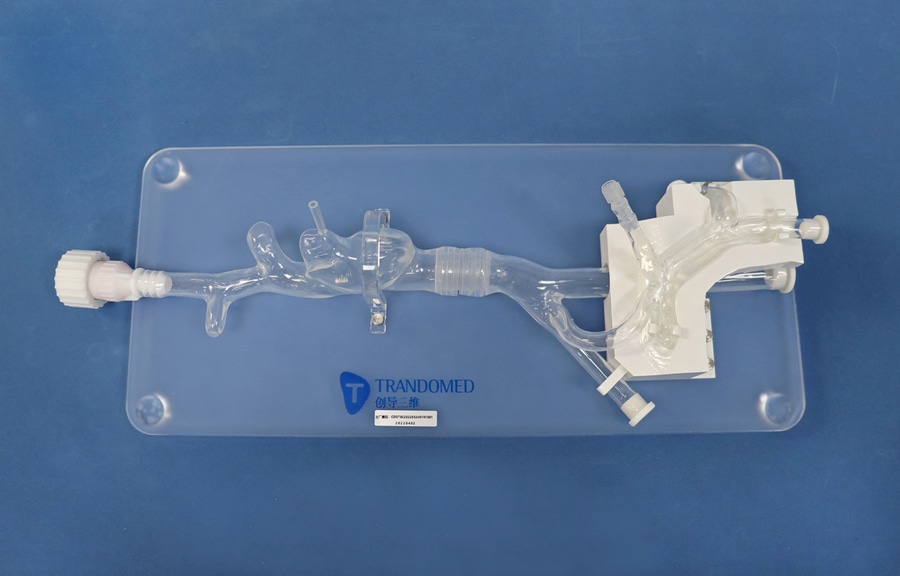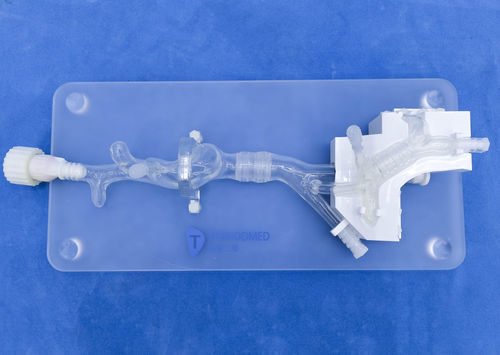
#Industry News
How does hepatic encephalopathy attack do after TIPS operation?
Jugular vein model
Hepatic encephalopathy (hepatic coma), the main complication of TIPS, is a high incidence period one month after surgery. Mild episodes may be manifested as personality changes, behavior abnormalities, sleep apnea, lethargy, forgetfulness, etc., and severe episodes may be manifested as lethargy or even coma.
Hepatic encephalopathy is associated with a number of factors, including diet, constipation, infection and more:
① Diet control: High protein diet is one of the main causes of post-TIPS hepatic encephalopathy, so special attention should be paid to diet, is also the most important point.
To fine grain, containing less fiber, less gas carbohydrates, such as rice (rotten), noodles, lotus root powder, pumpkin, vegetables and fruits (mashed or juiced), low salt and low oil (vegetable oil is better) light diet. Protein consumption should mainly be plant protein (such as tofu, because plant protein contains more branched chain amino acids, and is mainly metabolized in muscle, can not only supplement protein, but also prevent the emergence of hepatic encephalopathy). Animal protein (meat dishes) should be strictly controlled, as meat dishes (especially pork, beef and mutton!) It is an important factor to induce hepatic encephalopathy. For meat dishes, fish (pay attention to fish bones), milk, duck, skinless chicken is better.
Specific image, that is, 3-7 days after the operation, can only eat the equivalent of an egg protein every day, if there is no obvious abnormality, you can gradually increase protein intake, it is best to step increase, that is, first increase to 2 eggs a day, 3 days after no abnormality, then increase, and then observe 3-7 days, then increase protein intake, and so on. In this way, the body can gradually adapt to the relatively high blood ammonia state after surgery.
After a month, if there is no hepatic encephalopathy, the amount of protein eating can gradually, a small amount of increase, how much to eat to do not feel dizzy, lethargy, confused for the degree, this process needs to rely on patients and their families to explore together!
② Constipation: Pay attention to keep the stool unblocked (1-2 times a day), because constipation can also induce hepatic encephalopathy. Postoperative should be appropriate to drink water, eat more fresh vegetables and fruits, promote defecation. It is recommended that patients take lactilose for a long time after surgery. If the body can tolerate it (mainly diarrhea), it is recommended to take 1 pack (15ml) per day; if the diarrhea caused by it cannot be tolerated, it can be reduced to 1 pack every 2 days; if it is not possible, it can be reduced to 1-2 packs per week. In short, postoperative constipation is best avoided.
③ Pay attention to avoid cold and fever, prevent infection, appropriate exercise, enhance physical fitness.
In case of mild hepatic encephalopathy (often manifested as personality change, memory decline, lethargy, etc.), oral administration of aspartate ornithine granules (Regan granules) to reduce blood ammonia and lfructose-laxative treatment can be performed according to the instructions. In severe cases, vinegar enema, intravenous transfusion therapy (such as ornithine aspartate, arginine, branched chain amino acids, etc.), sedation as appropriate.





